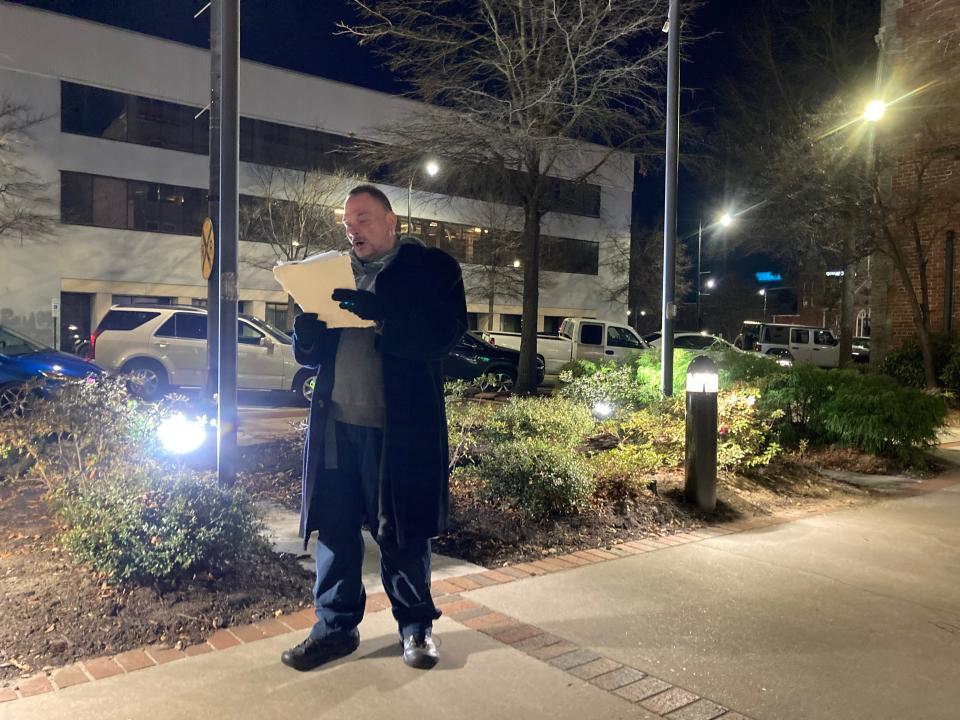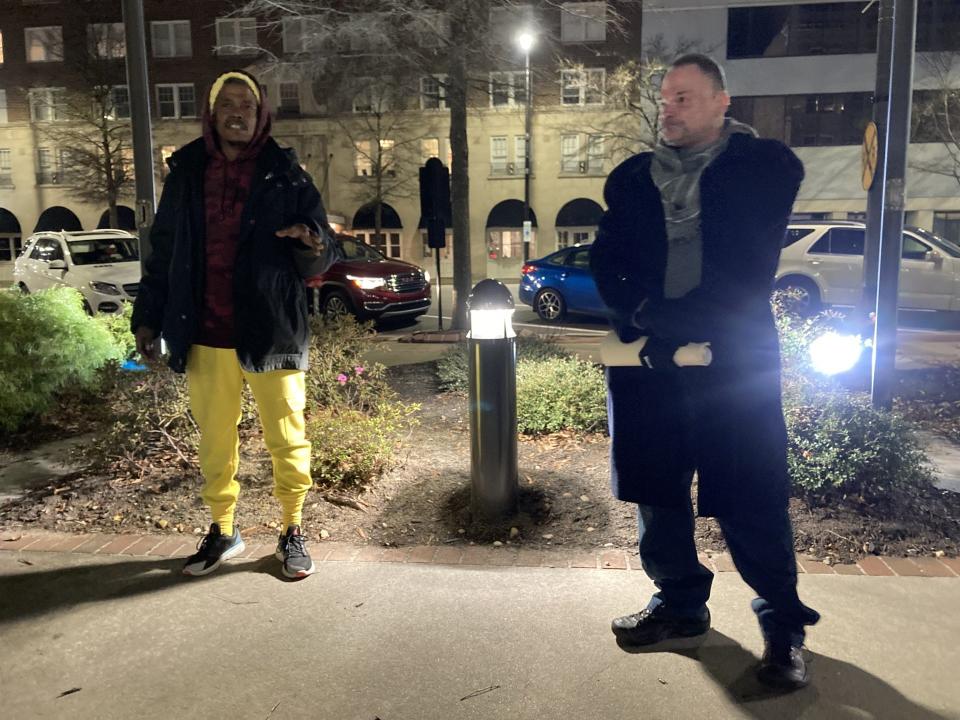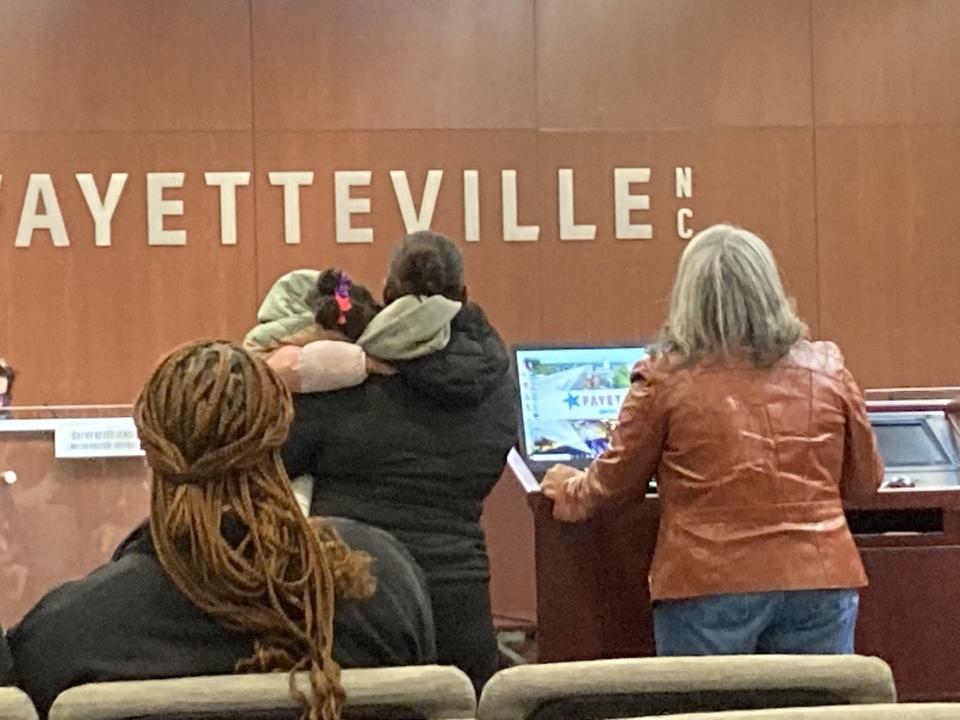Advocates concerned about busing Fayetteville's homeless to Durham
Homeless advocates and members of Fayetteville’s unhoused population say several homeless residents who were bused to Durham right before Christmas were blindsided by the situation.
On Dec. 20, more than a dozen residents were taken more than 90 miles away to the Durham Rescue Mission during a “white flag” weather day when more resources were needed, Fayetteville city spokesman Loren Bymer said.
Durham Rescue Mission was identified through community partners, and Camp Rockfish provided the transportation, Bymer said.
“The decision was made by the individuals themselves if they wanted to use the services provided by the Durham Rescue Mission,” he said.
Concerns
Ahead of Monday night’s Fayetteville City Council meeting and during the meeting, several individuals expressed concerns about sending residents to another city and said they think Fayetteville is not meeting the needs of the homeless population.
Joseph Wheeler, who is an unhoused Fayetteville resident and part of the Homeless Assembly, said he thinks there is a lack of resources and shelters for Fayetteville’s homeless population.
Wheeler said those who were on the bus were not informed about Durham Rescue Mission's requirements to stay there, which include religious observations, a strict dress code for women and working for the organization.
Durham Rescue Mission has served disenfranchised men, women and children since 1974, CEO Rob Tart said in a statement Tuesday.
"We have thousands of graduates of our program, who are tax-paying citizens living in their own homes and are productive members of society," Tart said.
Tart said that while the Durham Rescue Mission did not collaborate with anyone from Fayetteville for the homeless residents to be sent to Durham in December, they were welcomed because of "an open-door policy for individuals to come to DRM."
Tart said some stipulations are part of Durham Rescue Mission's programs that are agreed upon by participants and DRM.
According to an information sheet that was provided to the bus riders, the Durham Rescue Mission has men’s, women's and 12-month addiction recovery programs that provide shelter, three meals a day, clothing, Biblical counseling, financial planning, vocational training and education and employment assistance.
The information sheet states there are rules associated with the programs that include helping out with chores at the Mission, participating in church and Bible-related programs, not being allowed to have a vehicle and a dress code for women.
"All programs are VOLUNTARY,” the information sheet states. “Should someone decide to leave the Durham Rescue Mission, they will be responsible for their own transportation to the place they choose to go.”
Wheeler said he thinks sending Fayetteville's homeless residents to Durham is a result of Fayetteville’s homeless encampment ordinance that went into effect in August 2022.
“The laws are allegedly to prevent safety or health issues, while activists and homeless residents expressed that laws seemingly only appear to want to move the homeless out of sight of the general public,” Wheeler said. “And on a weekly basis now, since prior to Christmas, belongings have been thrown away, people have been displaced ... due to the ordinance that the city has in place to criticize the homeless for not being housed.”
Since the ordinance was enacted, only two citations have been issued, Bymer said.

Day Resource Center
Wheeler said the Day Resource Center, which opened in August, does not seem to be a solution for Cumberland County’s homeless residents.
They are unable to find bus passes or funding for housing resources, and electrical outlets outside the building are locked, preventing anyone from being able to charge a phone overnight, he said.
Wheeler said he thinks the homeless population would be better served by using the Day Resource Center as a shelter.
“They’re not doing a successful job ... That’s why we have ideas like this with busing people out of town instead of dealing with mental health, dealing with unhoused population, finding appropriate shelter to put them in,” he said.
According to the city, the Day Resource Center at 128 S. King St. is a multi-disciplinary service center operated by Cumberland HealthNET for people at risk or currently experiencing homelessness and is part of the Fayetteville City Council’s initiatives aimed at reducing poverty and homelessness.
It was designed as part of a 10-year plan to end homelessness after Hurricane Matthew hit the area in 2016 and impacted the community’s ability to care for unsheltered individuals and those displaced by the storm, Bymer said.
Homeless challenges
James Witherspoon has been part of Fayetteville’s homeless population off and on through the years.
While he’s not been issued a citation, Witherspoon said, officers are giving him five days to leave a city park where he’s been staying.
Witherspoon said he’s kept the park clean and picks up other people’s trash but because others may cause problems, he thinks Fayetteville’s homeless population is unfairly categorized as all being the same.
“That means you don’t know the individuals,” he said. “You're not getting to know anybody and their situation. You’re just judging.”

Wheeler and Witherspoon said the Day Resource Center seems to refer the homeless to the Salvation Army, but said people are not told about other programs like Mama Moses, which helps people find motel rooms or programs through the Department of Social Services that help with rental or utility assistance.
Witherspoon said he’s taken jobs helping vendors set up at the Bragg Boulevard Flea Market, but a lack of transportation and phone are hindrances to him finding a more sustainable job.
Moving away from downtown, Witherspoon said, seems to be another challenge.
Most of the programs, such as those that provide meals to the homeless, are in the downtown area, he said.
Witherspoon said that while he thinks some members of the homeless population may cause problems because of mental health issues or drug addictions, he does not think they want to be close to downtown near City Hall, Fayetteville Police Department of Cumberland County Jail.
The men said homeless residents seem to be pushed out into the county past Gillespie Street and Eastern Boulevard or toward Murchison Road, the Bonnie Doone neighborhood or unsafe areas.
“Everywhere you’re pushing me to, there’s a dead body,” Witherspoon said, noting several instances of bodies being found along the Bragg Boulevard corridor in Fayetteville last year.
Office of Community Safety
Wheeler said that he thinks the city’s Office of Community Safety needs a supervisor to assist the homeless population instead of police issuing citations.
“We need OCS to get real help in the city for the unhoused that want to improve their lives, and they can’t improve their lives if they don’t have the basic need of housing,” he said.
Lisette Rodriguez, who is a member of Fayetteville Freedom for All, a grassroots organization that is advocating for an Office of Community Services supervisor, said that before the bus left in December to head to Durham, she met with an 18-year-old man who was hesitant about going and didn’t want to be split from his brother.
Rodriguez said she and Wheeler helped arrange for the man, his brother and another person to come back to Fayetteville.
“This city failed them, and they were stranded with no way back,” she said.
Rodriguez said that another woman got off the bus once she realized she she learned about the religious requirements at the Durham Rescue Mission and that she wouldn't be allowed to have a vehicle.
“No one told the people in that bus (that) where they were going had cult-like requirements,” Rodriguez said.
Tart, with the mission, disagreed with the characterization.
"We are not cult like in our strategy or structure; our methods have been successful in rescuing individuals from drugs, alcohol, abusive relationships and addictive behavior," he said. "We help each individual address real and felt needs in their lives and give them help to develop hope for the future."
Related to now allowing cars, Tart said owning a car is "an individual right," but Durham Rescue Mission does not have parking space for all of the 500 people it serves.
Fayetteville activist and founder of the nonprofit Momma's Village, Angela Tatum Malloy, said she also met with individuals before the bus left and found “an unorganized situation.”
“Individuals were getting confusing messages and taking a chance on going to a city that they knew nothing about and potentially being unhoused in that city,” Malloy said.
Bymer said the Durham Rescue Mission was contacted before the bus left to ensure it “had the ability to receive all individuals who made the decision to be a part of a program or service offered.”
Malloy said she met a mother and her 4-year-old daughter who got off the bus.

Malloy said she spent more than seven hours driving the woman from resource to resource.
“Think about it if she was walking around with her 4-year-old daughter ... Get a director of OCS ... Get people to do the work that was not meant for our institutions to be doing,” she said.
County plans
While members of the Fayetteville City Council did not respond to homeless advocates during Monday night's meeting, the council later unanimously approved a rezoning and special use permit request from Cumberland County for transitional housing on properties located in the 300 block of Hawley Lane.
County officials and Commissioners' Chairman Glenn Adams said they plan to use the property, which by the site of the former Pauline Jones Elementary, to serve the homeless community and also partner with Fayetteville Technical Community College programming to help homeless individuals gain skillsets.
Staff writer Rachael Riley can be reached at rriley@fayobserver.com or 910-486-3528.
This article originally appeared on The Fayetteville Observer: Why advocates say lack of housing is causing issues in Fayetteville

